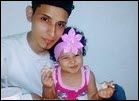 This past October, our Peace and Social Concerns Committee organized a candlelight vigil in remembrance of Valeria, the toddler who drowned along with her father Oscar as they tried to cross the Rio Grande River, as well as all those who remain in detention at our country's southern border. We thank our musicians, our presenters (who also included Jim Newby, our minister, and J.P. Lund, clerk of Wilmington Yearly Meeting), and all those who stood with us to light candles and contribute to a social justice offering that now carries on Valeria's legacy in the lives of three little Mexican boys who will grow up in a loving family and welcoming community of Quakers—so many lives now changed.
This past October, our Peace and Social Concerns Committee organized a candlelight vigil in remembrance of Valeria, the toddler who drowned along with her father Oscar as they tried to cross the Rio Grande River, as well as all those who remain in detention at our country's southern border. We thank our musicians, our presenters (who also included Jim Newby, our minister, and J.P. Lund, clerk of Wilmington Yearly Meeting), and all those who stood with us to light candles and contribute to a social justice offering that now carries on Valeria's legacy in the lives of three little Mexican boys who will grow up in a loving family and welcoming community of Quakers—so many lives now changed.
Here are excerpts from some of the voices who spoke for Valeria.
Taylor Leasure
Taylor Leasure’s voice was strong as she brought us to the banks of the Rio Grande. Among her words were these that drew parallels between Oscar and Valeria’s journey and a dark time in our own country’s history:
They walked until they would find the riverbank. In the darkness of night, when the moon was hidden, they walked. Many walked alone in that darkness—through brush and thickets—mothers and fathers walked because they could not bear leaving their children behind. They walked from terror and violence—injustice and inhumanity. They would come to the banks of that river we know so well—standing on one side enslaved, risking life itself to get across to the other side. It was one half mile across the banks of the Ohio River from Kentucky to Cincinnati. They walked all that way through brush and thickets to the promise of the Underground Railroad—to the support of Levi and Catherine Coffin, Harriet Beecher Stowe, and all those who dared risk their lives so that people might be free, so that children might have a better life. Mi nombre es Valeria!
Sara and Megan Myers
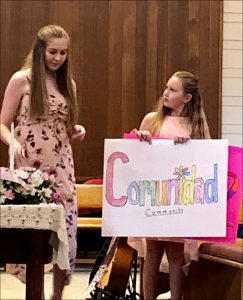 Ten-year-old Sara Myers represented the voices of our children with the signs she made for immigrant children still separated from their families. Her signs (in Spanish) translated to peace and community.
Ten-year-old Sara Myers represented the voices of our children with the signs she made for immigrant children still separated from their families. Her signs (in Spanish) translated to peace and community.
Megan Myers led us in lighting Valeria’s candle, the candle from which we would all light our candles at the end of our vigil.
Among her words were these:
We come together to commit to love through the flame of the candle that we will now light—Valeria’s candle. We remember Valeria and honor her life by the lighting of this candle by our children. Its one small flame will burn as we listen to messages, sing our songs, and lift our hearts together in prayer. Together as we join in our circle as our evening ends, we will light all our candles from this one small flame and through our unity, the spirit of the frail and beautiful Valeria will soar among us and deepen our commitment to building a world where no child ever again will wade in the water and lose her life to hate, intolerance, and injustice. If people hate, we will teach by our faith, our actions, and our words about this thing called love, no matter how long it takes. Mi nombre es Valeria!
The Two Dollar Bills
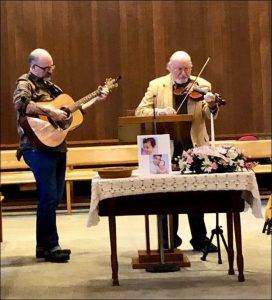 Beautiful and haunting music led us to feel Valeria’s presence among us, including music by The Two Dollar Bills, William Williams II and William Williams III, who attend Cincinnati Friends Meeting (CFM). Their song included lyrics about walking in the Light written especially for Valeria by William II.
Beautiful and haunting music led us to feel Valeria’s presence among us, including music by The Two Dollar Bills, William Williams II and William Williams III, who attend Cincinnati Friends Meeting (CFM). Their song included lyrics about walking in the Light written especially for Valeria by William II.
Renee Diaz
Young Friend Renee Diaz led us in our call to action by lighting our candles to remember Valeria, Oscar, and those separated in the ongoing immigration crisis.
Her words took us on a journey where children paid the ultimate price of injustice and intolerance—from Anne to Valeria:
As a young girl, she became an immigrant, torn from the only home she had known by hatred, racism, and genocide. She was forced to flee with her father, mother, and sister; staying in the place they called home would mean certain death. For her thirteenth birthday, she received a little red and white book filled with empty pages where she would come to write down her private thoughts, something Quakers call journaling. These are the words written on one page of that little book: ‘In spite of everything, I still believe that people are really good at heart. I simply can’t build up my hopes on a foundation of confusion, misery, and death. I see the world being turned into a wilderness. I hear the approaching thunder, which will destroy us. I can feel the suffering of millions and yet if I look up into the heavens, I think it will all come right, that this too will end, and that peace and tranquility will return again.’
She was not safe, even when her family left their home. After spending the last years of her young life in hiding, her family was found by the soldiers and taken away to a concentration camp. Anne Frank died in that camp, along with her sister. Her parents, from whom the girls had been separated, died in another camp, an entire family destroyed by hatred and bigotry and what happens when good people do and say nothing.
And so, what do we do and what do we say as we gather here to remember the young girl who died because of injustice and inhumanity? What do we do for that little girl, not yet two years old, who wanted from this world only one thing—to snuggle in the arms of her young mother and father? What do we do for and what do we say to Anne and to Valeria?
If we do nothing more, we will stand here united to curse the darkness that ripped the life out of them. We will light our flames from Valeria’s flame and as we do, it will deepen our commitment to building a world where no young girl ever again will be torn from the arms of her parents to die in a concentration camp. No little girl—not yet two years old—will wade in the water and lose her life to hate, intolerance, and injustice. Mi nombre es Valeria!
Joe Henry, Alex Myers, and Jennie Harner
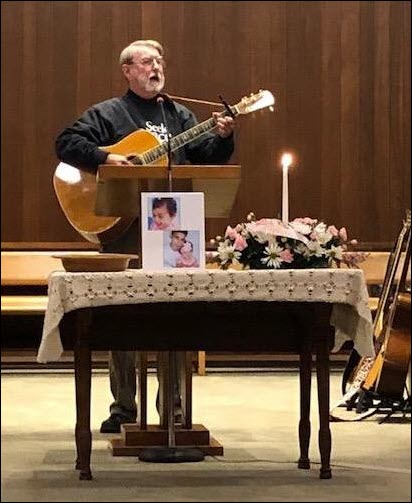 An attender at CFM, Joe Henry sang about the power of lighting one candle. He also led us as we gathered in our circle to light our candles and lift our voices in the hymn/prayer—Lord Prepare Me to be a Sanctuary.
An attender at CFM, Joe Henry sang about the power of lighting one candle. He also led us as we gathered in our circle to light our candles and lift our voices in the hymn/prayer—Lord Prepare Me to be a Sanctuary.
Alex Myers, born into CFM and now a Quaker Scholar at Wilmington College, began our worship alongside his grandmother Jennie Harner in a most memorable flute/piano duet of Wade in the Water.
Elizabeth Salinas Newby
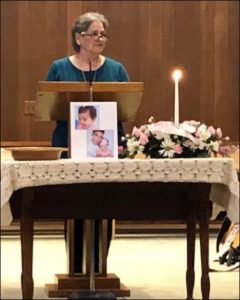 Elizabeth Salinas Newby stood for justice and equality as she shared her personal immigration story during our Voices for Valeria candlelight vigil. Elizabeth serves as clerk of our Peace and Social Concerns Committee.
Elizabeth Salinas Newby stood for justice and equality as she shared her personal immigration story during our Voices for Valeria candlelight vigil. Elizabeth serves as clerk of our Peace and Social Concerns Committee.
Rabbi Miriam Terlinchamp
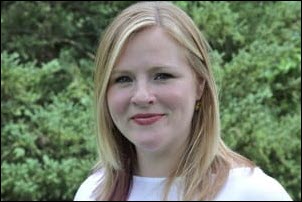 For some of us, the voices still linger, the words not soon to be forgotten. They were spoken in love and community to those gathered during our Voices for Valeria candlelight vigil.
For some of us, the voices still linger, the words not soon to be forgotten. They were spoken in love and community to those gathered during our Voices for Valeria candlelight vigil.
Among the words that spoke so eloquently to our own Quaker longings for justice and equality were those from Rabbi Miriam Terlinchamp of Temple Sholom. Standing in the gentle glow of one small candle flickering to celebrate the lives of one so tiny child and her father, lost to us except in memories, Rabbi Miriam shared some of her memories surrounding family and home.
Like so many, hers is an immigrant story. Her maternal grandfather came to the United States as his family fled the injustice and inhumanity of Nazi Germany. That act of fleeing, of needing to escape to be free, to continue to live, whether it be from Germany or Guatemala or El Salvador, always leaves a void—from generation to generation, the void is always there. It is one of the things most of us do not consider when forming our views about those we call immigrants or refugees. They leave behind so much more than they may ever find anywhere else. They leave behind home.
Rabbi Miriam’s grandfather left everything that home in Germany had meant to him, passing those memories on as stories to become part of their family heritage. So embedded were those memories that as a man, her father would go to Germany, to that town. He would walk down the street to find the house that had been the place a family called home before violence and inhumanity on a scale few could ever imagine forced them to flee. He would come to that very house and he would walk up and he would knock on the door, not wanting anything or asking anything of whoever might be on the other side, save for just a few minutes to stand on the inside, to feel the embrace of home that might console him for the rest of his life. Such an embrace would not come. No one opened the door. It did seem that someone was behind that door that separated them from the man on the outside, but the door did not open.
A generation later, that man’s daughter, now a respected and beloved rabbi, would seek to find what had been denied her father. Like him and like her grandfather, the longing for home—even one she had never experienced for herself—brought her to Germany, to that town, to that street and to that door. Like him, she knocked on the door and had a sense that someone was inside, perhaps even looking out at her. She knocked, not wanting anything or asking anything of whoever might be on the other side, save for just a few minutes to stand inside where a part of her family had once lived, to feel the embrace of what had been home to them; and through her they would have in some measure felt that embrace of home one more time. No one answered the door. She knocked, compelled by something inside her. She knocked for her grandfather and her father, to bring them, if for only a brief moment through her, that sense of home. The door did not open.
Rabbi Miriam assured us that it did not so much matter that the door did not open. What mattered is that her father made that journey, uncertain of the outcome. What mattered is that she made that journey, uncertain of the outcome. What matters is that someday she sees herself returning to that town, to walk down that street and to knock on that door, this time perhaps with her own children. Perhaps there might even come the day when she, like her father, can no longer make the journey, and so her children will make it without her, perhaps their children after that—that’s how powerful that call to home can be.
We shall remain indebted to Rabbi Miriam for sharing her story, for being our teacher during our time together on October 19th. Although not physically as real as the door her family has knocked on, we came together that night to knock on the seemingly impenetrable door (or wall) of injustice, racism, and inhumanity, to lift our voices and to light our candles to curse the darkness.
Together we journeyed to that spiritual door and together we knocked. Despite the depth of our caring and compassion, it did not open. So many children remain locked away in cages as if they have committed inexcusable crimes. No family was reunited because of our efforts on this one night. Valeria and her father Oscar are as gone to us as they were on that day in June when the waters of the Rio Grande took them away. But something changed. Our commitment to social justice deepened!
It might seem an act of futility to continue, but then there was Rabbi Miriam’s story to encourage us—from the granddaughter, the daughter, who continued her family’s journey to that town in Germany, to that street and up to that door, in the hopes that perhaps it might open and she might walk in and know this was that place where some part of her once belonged, still belongs. There is no promise that her door will ever open, but continue the journey she must.
Continue the journey we will, next year and the years to come. We did not come together for just one night in October. We came together as part of a journey that will continue as we speak to the injustices that lock away children, tear apart families, and contribute to the deaths of little children—some, like Valeria, not quite two years old. We are committed to our journey. How long must we continue—for as long as it takes. Be ye not dismayed and trust that the door will open!
